Monteverdi Sierra
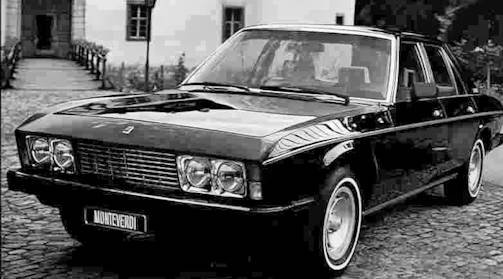 |
|
|
Production period: |
1977 to 1982 |
|
Class: |
Luxury car |
|
Body versions: |
Saloon, convertible, station wagon |
|
Engines: |
Gasoline: 5.2-5.9 litres (124-132 kW) |
|
Length: |
4680-4880 mm |
|
Width: |
1820 mm |
|
Height: |
1280-1400 mm |
|
Wheelbase: |
2740-2850 mm |
|
Curb weight: |
1400-1650 kg |
The Monteverdi Sierra was a luxury sedan of the Swiss automaker Monteverdi, which was produced from 1977 to 1982.
History
The high-priced luxury vehicle replaced the High Speed 375 series since 1967. With the Sierra, the Swiss company responded to the first oil crisis in the mid-1970s, as a result of which interest in heavy, fuel-intensive high-performance sports cars had dropped: the Sierra was smaller, lighter and cheaper than the previous Monteverdi models. At the same time, it documented a change in company policy, which led to more luxury and comfort. Monteverdi continued with the Sierra, which had already been successfully applied a year earlier with the SUV safari. The press overwhelmingly praised the Sierra sedan; In the market, however because of the high price, it could not prevail: Until 1982, it was only produced in small quantities However, some components derived from the Fiat and Renault.
The Monteverdi Sierra Unlike the high-speed series coupes, convertibles and sedans, Monteverdi had not fully developed the car itself; Rather, the Swiss company used the body structure and drive technology of a mass production vehicle, which was visually alienated by individual attachments and received an upgraded interior. By relying on mass production technology, Monteverdi was largely able to save on the development costs associated with designing its own car; In addition, solid (mass production) technology ensured reliable everyday usability. As a basis for the Sierra Peter Monteverdi chose the so-called F-platform of the American car manufacturer Chrysler. This design was introduced with the model names Dodge Aspen and Plymouth Volaré in 1976 and was to compete on the American market with high-quality import vehicles such as the Mercedes-Benz. It corresponded in its dimensions to some extent.
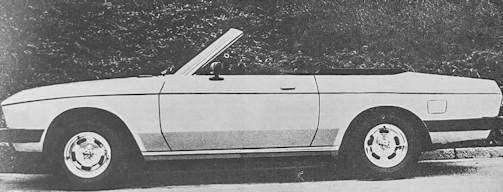
Monteverdi took over from Chrysler the underbody, the drive technology including suspension, the entire passenger compartment, the glazing and large parts of the body panels (especially roof and doors). The 1980 published Monteverdi brand Chronicle confirms the kinship relationship with American Chrysler models specifically. The visual differences between the Sierra and the Dodge Aspen resulted primarily from an independent front and rear sections, for which the Carrozzeria Fissore according to the plans Peter Monteverdi had developed a European-style design. Unlike the Chrysler vehicles of the same origin, the Sierra had slightly curved front fenders that mimicked the lines of the High Speed 375 models, and a subtle, chrome-plated radiator grille with twin headlights and parts, from Fiat. With this front-end Monteverdi made a family resemblance to the similarly designed safari. At the rear, a rectangular, reminiscent of the 375/4 design, were installed on the tail lights of the Renault 12. The narrow, largely plastic components using bumper construction made the Sierra appear significantly sportier than the Dodge Aspen. The significantly shorter cut bumpers also reduced the outer length of the vehicle compared to the original model by 20 centimetres. In his entire appearance of the now-defunct Sierra resembled Fiat 130 sedan, but was more than twice as expensive as the Italian car. In the interior, Monteverdi installed leather BMW seats.
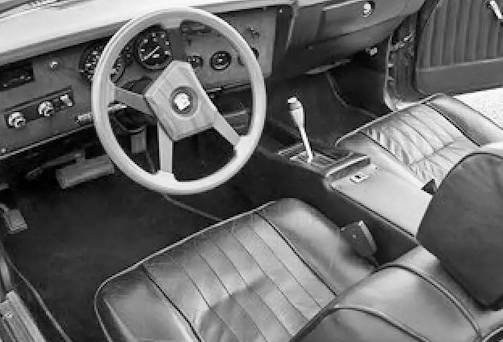
The drive technology was taken over unchanged by the Dodge Aspen and the Plymouth Volare. These included, among other things, the rear rigid axle, a relatively antiquated for the price range of the Sierra and uncomfortable solution. Although undertook Monteverdi 1976 and 1977 individual experiments, a self-constructed De Dion rear axle however, these approaches were discontinued early. Whether at all single vehicles were sold with the De Dion rear axle is unclear. Peter Monteverdi claimed that average customers would barely notice the difference between a rigid axle and an independent suspension. Monteverdi offered only the two strongest engines of the Dodge Aspen and the Plymouth Volare. The choice was a 5.2-liter eight-cylinder engine with quadruple carburettor and a power of 118 kW (160 hp) and a 5.9-liter version with about 135 kW, which was referred to in a sales prospectus as "hot version”, Both engines were also used in exclusive vehicles from other manufacturers; for example, they found themselves in Bristol 603.
- PERFORMANCE: 5,898 cc
359.9 cu in, 5,898 cc
max power (DIN): 180 hp (132.5 kW) at 4,000 rpm
max torque (DIN): 287 1b ft. 39.6 kg m (388 Nm) at 2,400 rpm; 30.5 hp/l (22.5 kW/l)
max speed: about 124 mph, 200 km/h:
power-weight ratio: 19.6 lb/hp (26.6 lb/kW), 8.9 kg/hp (12 kg/kW)
consumption: 20.2 m/ imp gal, 16.8 m/US gal - PERFORMANCE: 5,210 cc
317.9 cu in, 5,210 cc
max power (DIN) 160 hp (117.8 kW) at 3,500 rpm,
max torque (DIN) 287 1b ft, 39.6 kg m (388.4 Nm) at 2,000 rpm
30.7 hp/l (22.6 kW/l).
power-weight ratio 22 lb/hp (30 lb/kW), 10 kg/hp (13.6 kg/kW).
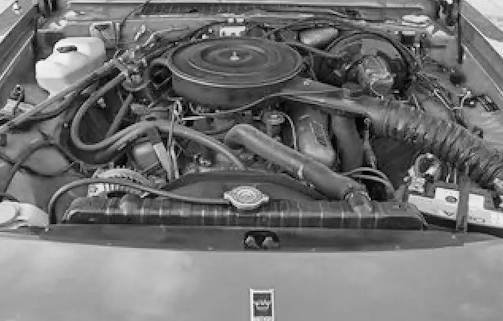
Standard model was the four-door Sierra sedan, which was offered from 1977 to 1982. At its presentation, the base price of Sierra 5.2 amounted to 69,000 Swiss francs; the version equipped with the 5.9-liter engine was 5,000 Swiss francs more expensive. The standard equipment included a leather upholstery, power steering and electric windows (but there are at least two vehicles with manual crank windows front and rear); Air conditioning and central locking were on the other hand extra charge. At the 1978 Geneva Motor Show, Monteverdi presented a cabriolet version of the Sierra, based on the shortened chassis of the Dodge Aspen Coupe. The sale price was reported to be 89,000 Swiss francs. Although it then more expensive next to the lot Rolls-Royce Corniche was no four-seater luxury convertible and thus no direct competition, the expected success failed to materialize and it was completed only two copies. A red painted vehicle (with manual window regulators) was delivered to the Swiss publisher Frey, another in silver colour remained in the factory. Another derivation is the Sierra Station Wagon from 1979, a five-door station wagon based on the Dodge Aspen Station Wagon. The vehicle received the usual changes at the front end; at the rear end the well-known bumpers were installed as well as the rear lights of the Peugeot 504 Break, which made a family resemblance to the safari. The vehicle took up the concept of the luxury estate it remained with the one-off piece.
The Sierra models were not produced in-house, but by hand-made by external body shops by order. How many Sierra sedans were made between 1977 and 1982 is unknown. The production of the Sierra ended in 1982, when Chrysler set the Dodge Aspen as well as the Plymouth Volare. Subsequently, Monteverdi sold the rights to the name "Sierra" to the Ford Corporation, which gave the name to the successor of the Ford Taunus.
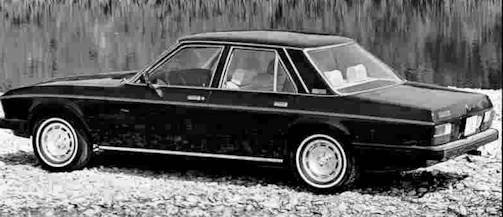
Technical
-
Monteverdi Sierra Technical details and specifications (1977-1982)
ENGINE: 5,210 cc
Chrysler, front
4 stroke; 8 cylinders, Vee-slanted at 90°
317.9 cu in, 5,210 cc
bore and stroke: 3.91 x 3.31 in, mm
compression ratio: 8.5:1
5 crankshaft bearings
valves: overhead, in line hydraulic tappets
camshafts: 1, at centre of Vee
lubrication: rotary pump, full flow filter
13.2 imp pt, 15.8 US pt
1 Carter downdraught 4-barrel carburettor
fuel feed: mechanical pump
water-cooled, 28.2 imp pt, 33.8 US pt, 16 1.ENGINE: 5,898 cc
Chrysler, front
4 stroke; 8 cylinders, Vee-slanted at 90°
359.9 cu in, 5,898 cc
bore and stroke: 4 x 3.58 in, 101.6 x 90.9 mm
compression ratio: 8.5:1
5 crankshaft bearings
valves: overhead, in line, hydraulic tappets
camshafts: 1, at centre of Vee
lubrication: rotary pump.
1 Carter full flow filter
downdraught twin barrel carburettor
fuel feed: mechanical pump
water-cooled, 28.2 imp pt, 33.8 US pt
TRANSMISSION
driving wheels: rear
gearbox: Torqueflite automatic transmission, hydraulic torque converter and planetary gears with 3 ratios, max ratio of converter at stall 2.3, possible manual selection
ratios: 1st 2.450, 2nd 1.450, 3rd 1, rev 2.200
gear lever location: central
final drive: hypoid bevel, limited slip differential
axle ratio: 2.710CHASSIS
type integral
front suspension: upper wishbones and lower horizontal arms combined with trailing radius rods.
coil springs, anti-roll bar, adjustable telescopic dampers
rear: de Dion rigid axle, semi-elliptic leafsprings, adjustable telescopic dampers.STEERING
worm and roller, servo.BRAKES
front disc (diameter 11.8 in. 30 cm), rear drum, dual circuit, servo
lining area: total 139.5 sq in, 900 sq cm.ELECTRICAL EQUIPMENT
12 V
65 Ah battery
55 A alternator
4 halogen headlamps.
DIMENSIONS AND WEIGHT
wheel base: 112.20 in, 285 cm
tracks: 59.44 in, 151 cm front, 58.66 in, 149 cm rear
length: 192.12 in, 488 cm
width: 71.65 in, 182 cm
height: 55.12 in, 140 cm
ground clearance: 5.9 in, 15 cm
weight: 3,528 1b, 1,600 kg
turning circle: 41.9 ft, 12.8 mfuel
tank: 18 imp gal, 21.6 US gal, 82 1.
© Motor car HistoryMonteverdi Sierra models specifications
Monteverdi
Sierra Limousine 5.2
Sierra Limousine 5.9
Sierra Cabriolet
Engine:
Eight-cylinder V-engine (four-stroke), fork angle 90 °
displacement:
5210 cc
5898 cc
5898 cc
Bore × stroke:
99.3 × 84.1
101.6 × 90.9
101.6 × 90.9
Power at 1 / min:
124 kW (168 hp) at 4000
132 kW (180 hp) at 4000
132 kW (180 hp) at 4000
Max. Torque at 1 / min:
339 Nm at 1600
398 Nm at 1600
398 Nm at 1600
Compression:
8.5: 1
Fuel supply:
1 × 2 double carburettor
Valve control:
Overhead valves
Cooling:
water cooling
Transmission:
Automatic, three forward gears
rear-wheel driveFront suspension:
Wishbone
coil springsRear suspension:
Rigid axle
coil springsbrakes:
Disc brakes front
drum brakes rearBody:
steel
Track front / rear:
1510/1490
Wheelbase:
2850 mm
2850 mm
2740 mm
Dimensions:
4880 × 1820 × 1400
4680 × 1820 × 1280
Empty weight:
1600
1650
1400
maximum speed:
180
200
200
0-100 km / h:
10 sec.
Manuals
-
Monteverdi Previous 5 / 5 Next
